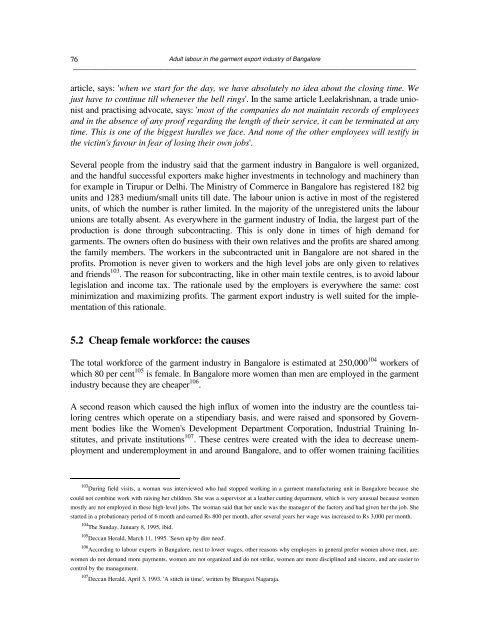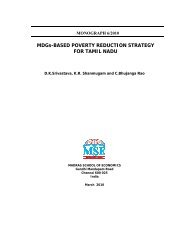You also want an ePaper? Increase the reach of your titles
YUMPU automatically turns print PDFs into web optimized ePapers that Google loves.
76<br />
Adult <strong>labour</strong> <strong>in</strong> <strong>the</strong> <strong>garment</strong> <strong>export</strong> <strong>in</strong>dustry <strong>of</strong> Bangalore<br />
──────────────────────────────────────────────────────────────────────────────────────────────<br />
article, says: 'when we start for <strong>the</strong> day, we have absolutely no idea about <strong>the</strong> clos<strong>in</strong>g time. We<br />
just have to cont<strong>in</strong>ue till whenever <strong>the</strong> bell r<strong>in</strong>gs'. In <strong>the</strong> same article Leelakrishnan, a trade unionist<br />
<strong>and</strong> practis<strong>in</strong>g advocate, says: 'most <strong>of</strong> <strong>the</strong> companies do not ma<strong>in</strong>ta<strong>in</strong> records <strong>of</strong> employees<br />
<strong>and</strong> <strong>in</strong> <strong>the</strong> absence <strong>of</strong> any pro<strong>of</strong> regard<strong>in</strong>g <strong>the</strong> length <strong>of</strong> <strong>the</strong>ir service, it can be term<strong>in</strong>ated at any<br />
time. This is one <strong>of</strong> <strong>the</strong> biggest hurdles we face. And none <strong>of</strong> <strong>the</strong> o<strong>the</strong>r employees will testify <strong>in</strong><br />
<strong>the</strong> victim's favour <strong>in</strong> fear <strong>of</strong> los<strong>in</strong>g <strong>the</strong>ir own jobs'.<br />
Several people from <strong>the</strong> <strong>in</strong>dustry said that <strong>the</strong> <strong>garment</strong> <strong>in</strong>dustry <strong>in</strong> Bangalore is well organized,<br />
<strong>and</strong> <strong>the</strong> h<strong>and</strong>ful successful <strong>export</strong>ers make higher <strong>in</strong>vestments <strong>in</strong> technology <strong>and</strong> mach<strong>in</strong>ery than<br />
for example <strong>in</strong> Tirupur or Delhi. The M<strong>in</strong>istry <strong>of</strong> Commerce <strong>in</strong> Bangalore has registered 182 big<br />
units <strong>and</strong> 1283 medium/small units till date. The <strong>labour</strong> union is active <strong>in</strong> most <strong>of</strong> <strong>the</strong> registered<br />
units, <strong>of</strong> which <strong>the</strong> number is ra<strong>the</strong>r limited. In <strong>the</strong> majority <strong>of</strong> <strong>the</strong> unregistered units <strong>the</strong> <strong>labour</strong><br />
unions are totally absent. As everywhere <strong>in</strong> <strong>the</strong> <strong>garment</strong> <strong>in</strong>dustry <strong>of</strong> <strong>India</strong>, <strong>the</strong> largest part <strong>of</strong> <strong>the</strong><br />
production is done through subcontract<strong>in</strong>g. This is only done <strong>in</strong> times <strong>of</strong> high dem<strong>and</strong> for<br />
<strong>garment</strong>s. The owners <strong>of</strong>ten do bus<strong>in</strong>ess with <strong>the</strong>ir own relatives <strong>and</strong> <strong>the</strong> pr<strong>of</strong>its are shared among<br />
<strong>the</strong> family members. The workers <strong>in</strong> <strong>the</strong> subcontracted unit <strong>in</strong> Bangalore are not shared <strong>in</strong> <strong>the</strong><br />
pr<strong>of</strong>its. Promotion is never given to workers <strong>and</strong> <strong>the</strong> high level jobs are only given to relatives<br />
<strong>and</strong> friends 103 . The reason for subcontract<strong>in</strong>g, like <strong>in</strong> o<strong>the</strong>r ma<strong>in</strong> textile centres, is to avoid <strong>labour</strong><br />
legislation <strong>and</strong> <strong>in</strong>come tax. The rationale used by <strong>the</strong> employers is everywhere <strong>the</strong> same: cost<br />
m<strong>in</strong>imization <strong>and</strong> maximiz<strong>in</strong>g pr<strong>of</strong>its. The <strong>garment</strong> <strong>export</strong> <strong>in</strong>dustry is well suited for <strong>the</strong> implementation<br />
<strong>of</strong> this rationale.<br />
5.2 Cheap female workforce: <strong>the</strong> causes<br />
The total workforce <strong>of</strong> <strong>the</strong> <strong>garment</strong> <strong>in</strong>dustry <strong>in</strong> Bangalore is estimated at 250,000 104 workers <strong>of</strong><br />
which 80 per cent 105 is female. In Bangalore more women than men are employed <strong>in</strong> <strong>the</strong> <strong>garment</strong><br />
<strong>in</strong>dustry because <strong>the</strong>y are cheaper 106 .<br />
A second reason which caused <strong>the</strong> high <strong>in</strong>flux <strong>of</strong> women <strong>in</strong>to <strong>the</strong> <strong>in</strong>dustry are <strong>the</strong> countless tailor<strong>in</strong>g<br />
centres which operate on a stipendiary basis, <strong>and</strong> were raised <strong>and</strong> sponsored by Government<br />
bodies like <strong>the</strong> Women's Development Department Corporation, Industrial Tra<strong>in</strong><strong>in</strong>g Institutes,<br />
<strong>and</strong> private <strong>in</strong>stitutions 107 . These centres were created with <strong>the</strong> idea to decrease unemployment<br />
<strong>and</strong> underemployment <strong>in</strong> <strong>and</strong> around Bangalore, <strong>and</strong> to <strong>of</strong>fer women tra<strong>in</strong><strong>in</strong>g facilities<br />
103 Dur<strong>in</strong>g field visits, a woman was <strong>in</strong>terviewed who had stopped work<strong>in</strong>g <strong>in</strong> a <strong>garment</strong> manufactur<strong>in</strong>g unit <strong>in</strong> Bangalore because she<br />
could not comb<strong>in</strong>e work with rais<strong>in</strong>g her children. She was a supervisor at a lea<strong>the</strong>r cutt<strong>in</strong>g department, which is very unusual because women<br />
mostly are not employed <strong>in</strong> <strong>the</strong>se high-level jobs. The woman said that her uncle was <strong>the</strong> manager <strong>of</strong> <strong>the</strong> factory <strong>and</strong> had given her <strong>the</strong> job. She<br />
started <strong>in</strong> a probationary period <strong>of</strong> 6 month <strong>and</strong> earned Rs 800 per month, after several years her wage was <strong>in</strong>creased to Rs 3,000 per month.<br />
104 The Sunday, January 8, 1995, ibid.<br />
105 Deccan Herald, March 11, 1995. 'Sewn up by dire need'.<br />
106 Accord<strong>in</strong>g to <strong>labour</strong> experts <strong>in</strong> Bangalore, next to lower wages, o<strong>the</strong>r reasons why employers <strong>in</strong> general prefer women above men, are:<br />
women do not dem<strong>and</strong> more payments, women are not organized <strong>and</strong> do not strike, women are more discipl<strong>in</strong>ed <strong>and</strong> s<strong>in</strong>cere, <strong>and</strong> are easier to<br />
control by <strong>the</strong> mana<strong>gem</strong>ent.<br />
107 Deccan Herald, April 3, 1993. 'A stitch <strong>in</strong> time', written by Bhargavi Nagaraja.


















